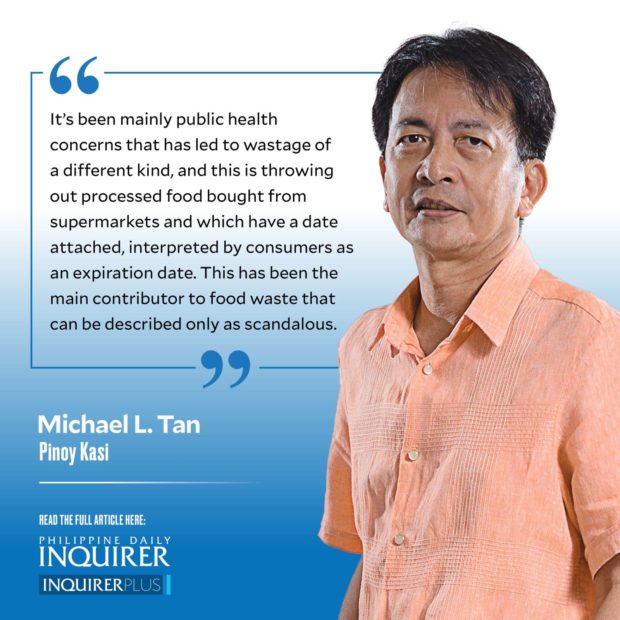‘Exp,’ ‘BB,’ ‘Use by’
Here’s another angle to the ongoing conference on the climate emergency: food waste.
Many of us grew up with the mantra, “Don’t waste your food. There are hungry people out in the streets.” In Western countries, parents would invoke starving children in developing countries as the reason not to leave food on the plate.
But who would have known that through the years, the amount of food being wasted would grow, and for unexpected reasons. In China, a country that evoked images of starving children and adults as recently as 50 years ago, over-indulgence in food, and the hosting of banquets, have become status symbols, and the government issued an action plan just last Monday encouraging consumers to report restaurants that were wasting food, and advocating buffets, rather than banquets, for official receptions.
In the Philippines, the National Nutrition Survey of 2018 reported an average of 66.8 grams food waste per day, of which 48 grams or 71 percent of total food waste were cereals (presumably mostly rice).
The food waste reaches scandalous proportions when we talk about restaurants, which, invoking public health reasons, throw out unconsumed food each day, some of which is then “scavenged” by the poor, who then recook and consume the discarded food or pagpag.
It’s been mainly public health concerns that has led to wastage of a different kind, and this is throwing out processed food bought from supermarkets and which have a date attached, interpreted by consumers as an expiration date. This has been the main contributor to food waste that can be described only as scandalous. In 2013, the Natural Resources Defense Council and the Harvard Law School produced a report estimating that 30-40 percent of food is never eaten, with a value estimated at $165 billion.
The report, entitled “The Dating Game: How Confusing Food Date Labels Lead to Food Waste in America,” calls for clearer guidelines on food safety. I was surprised to read that the US Food and Drug Administration does not actually require expiration dates on any food except infant formula. But food manufacturers use labels, mainly “Sell by” as a guide for stores to manage their inventories, and “Use by” to indicate the date where the product’s peak quality can be assured. The manufacturers tend to be conservative with the dates, to avoid lawsuits from consumers who might come down with food poisoning, or who simply are not happy with the quality of the food product.
In Western European countries, labels are required but they are not that much clearer. In Britain, labels are mainly “Use by,” which is a safety warning, i.e., food poisoning could occur if you consume beyond the date. The other label is “Best before,” which is like the American “Use by,” an indication of quality.
The United Kingdom and other Western European countries have been more conscious about food waste, launching all kinds of campaigns for at least two decades now, including food rescue programs where scraps and surplus farm products (e.g. milk, cheese) are collected, “recycled” and served at some restaurants. During the 2015 UN meeting on Sustainable Development Goals, 30 world leaders were served lunch prepared from vegetable scraps, rejected fruit, and other food waste. (I got to eat at one such food rescue restaurant in Amsterdam and I can assure you the “scraps” matched the fine dining ambience … and prices.)
Two years ago, Scott Nash, an American organic food store owner, made the news in the US and Europe when he wrote about how he and his family had been consuming many of the “Use by” and “Sell by” products beyond the manufacturer’s dates … and surviving. Nash believes we should use our senses to determine if food is indeed spoiled or not.
I do worry that younger Filipinos, growing up with processed foods, may not be able to tell when food—fresh or processed—is still good or not. We will need to launch a campaign against food waste starting in schools, integrated with food literacy, “food rescue” recipes and strategies, and understanding “Exp,” “BB,” and “Use by” labels.
Finally, anti-food waste campaigns must consider the big picture: climate emergency. Food production involves greenhouse gas emissions at every step of the way such as the use of fossil fuels for production, transport, cooking, and processing of food, not to mention direct gas emissions, literally, from animals raised for food. Throwing out the uneaten food wastes means needless contributions to climate warming.





















